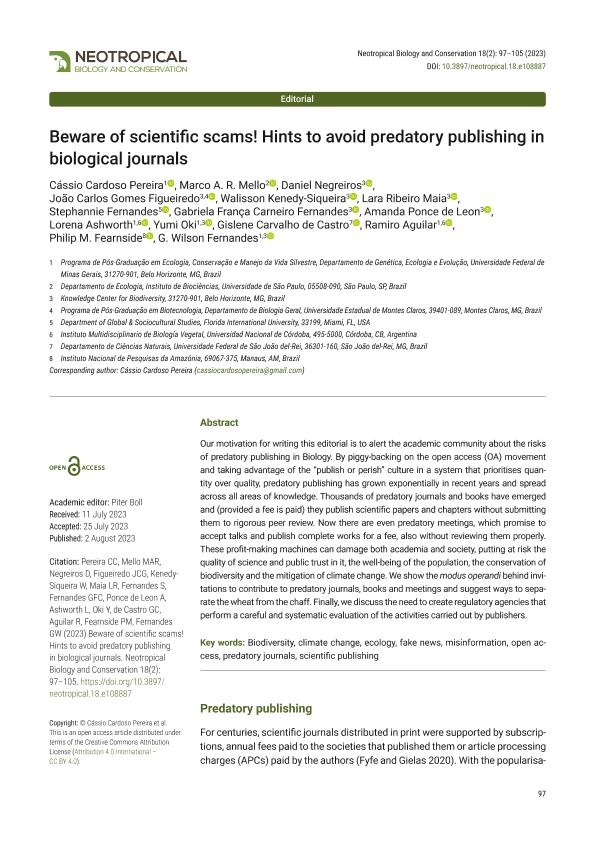Artículo
Beware of scientific scams! Hints to avoid predatory publishing in biological journals
Pereira, Cássio Cardoso; Mello, Marco A. R.; Negreiros, Daniel; Figueiredo, João Carlos Gomes; Kenedy-Siqueira, Walisson; Maia, Lara Ribeiro; Fernandes, Stephannie; Fernandes, Gabriela França Carneiro; Ponce de Leon, Amanda; Ashworth, Lorena ; Oki, Yumi; de Castro, Gislene Carvalho; Aguilar, Ramiro
; Oki, Yumi; de Castro, Gislene Carvalho; Aguilar, Ramiro ; Fearnside, Philip M.; Fernandes, Geraldo Wilson Afonso
; Fearnside, Philip M.; Fernandes, Geraldo Wilson Afonso
 ; Oki, Yumi; de Castro, Gislene Carvalho; Aguilar, Ramiro
; Oki, Yumi; de Castro, Gislene Carvalho; Aguilar, Ramiro ; Fearnside, Philip M.; Fernandes, Geraldo Wilson Afonso
; Fearnside, Philip M.; Fernandes, Geraldo Wilson Afonso
Fecha de publicación:
08/2023
Editorial:
Pensoft Publishers
Revista:
Neotropical Biology and Conservation
e-ISSN:
2236-3777
Idioma:
Inglés
Tipo de recurso:
Artículo publicado
Clasificación temática:
Resumen
Our motivation for writing this editorial is to alert the academic community about the risks of predatory publishing in Biology. By piggy-backing on the open access (OA) movement and taking advantage of the “publish or perish” culture in a system that prioritises quantity over quality, predatory publishing has grown exponentially in recent years and spread across all areas of knowledge. Thousands of predatory journals and books have emerged and (provided a fee is paid) they publish scientific papers and chapters without submitting them to rigorous peer review. Now there are even predatory meetings, which promise to accept talks and publish complete works for a fee, also without reviewing them properly. These profit-making machines can damage both academia and society, putting at risk the quality of science and public trust in it, the well-being of the population, the conservation of biodiversity and the mitigation of climate change. We show the modus operandi behind invitations to contribute to predatory journals, books and meetings and suggest ways to separate the wheat from the chaff. Finally, we discuss the need to create regulatory agencies that perform a careful and systematic evaluation of the activities carried out by publishers.
Archivos asociados
Licencia
Identificadores
Colecciones
Articulos(IMBIV)
Articulos de INST.MULTIDISCIPL.DE BIOLOGIA VEGETAL (P)
Articulos de INST.MULTIDISCIPL.DE BIOLOGIA VEGETAL (P)
Citación
Pereira, Cássio Cardoso; Mello, Marco A. R.; Negreiros, Daniel; Figueiredo, João Carlos Gomes; Kenedy-Siqueira, Walisson; et al.; Beware of scientific scams! Hints to avoid predatory publishing in biological journals; Pensoft Publishers; Neotropical Biology and Conservation; 18; 2; 8-2023; 97-105
Compartir
Altmétricas



